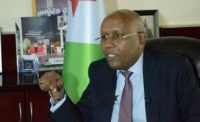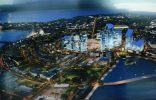By Andualem Sisay Gessesse – December 7, 2017, Djibouti –
Djibouti, which is investing hugely on the development of new ports and expansion of the existing, says it continues investing to become the major logistic hub in East Africa.
Ilyas Moussa Dewaleh, Minister of Economy and Finance of Djibouti said his country don’t worry about ongoing or future investments by the East African countries including Mombasa Port of Kenya, Berbera in Somaliland and Port of Assab. He made the on Monday remark at the opening of international trade fair his country is hosting.
“…The strong economic growth of Ethiopia has benefited Djibouti. This is why we are investing billions of dollars in order to create much more wealth and share…Tomorrow at some point of time Eritrea will come to back to the right track,” Mr. Ilyas said to journalists during a press conference that followed the opening session.
“It will not be the disturber of this region. It might be the contributor of wealth creation of this region with new leadership or with new policy. This is what will happen today or after ten days or after ten years. At that exact day we will welcome them”.
Djibouti has embarked on several mega projects worth $14 billion including the three ports completed this year and other projects expected to be finalized in the coming years.

“So, we don’t consider anyone in this region with a port to be a threat or risk [for Djibouti]. We know and we are working to make sure that we will remain the major logistic hub not only for Ethiopia but also the whole region [East Africa],” he said.
The small east African country’s major income has become the port service fee from Ethiopia in recent years. For the past five years Djibouti’s economy has been growing around 6% on average mostly attributed to the fast growing of the import of the neighboring Ethiopia, which quit using the Port of Assab after the war broke with Eritrea in May 1998.
Inspired by the fast growth of Ethiopian economy and increasing port service income, Djibouti today has embarked on multiple mega infrastructure projects including the introduction of three new ports this year.
As stated in its vision 2035, Djibouti aims at transforming the country into a logistics and commercial hub for East Africa. The country is getting most of the loans from the Chinese government like its neighbor Ethiopia.
Minister Ilyas who is born and grown up in Ethiopia’s Dire Dawa city, made the comment two years after Arkebe Equbay (PhD), economic advisor to the Prime Minister of Ethiopia, told his hope to a state Amharic language magazine – Zemen- that in the coming ten years Ethiopia will be using Port of Assab.
During the interview Dr. Arkebe also mentioned that Ethiopia port ids not a problem for Ethiopia as the country can also use Mombasa Port of Kenya, Berbera of Somaliland in addition to Djibouti Port.
According to the last April assessment of International Monetary Fund (IMF)that appreciated Djibouti’s plan ad implementations so far, the advantages of the strategic location have not been exploited in full.
Meanwhile Growth in the past has been uneven and insufficient to lift the population from poverty and provide sufficient jobs. As a result, about 41% of the population is poor, 23% live in extreme poverty, and the unemployment rate is 39%, according to IMF.
“Despite more growth, the country is now at a high risk of debt distress as most of these infrastructure investments have been financed externally—pushing external debt from 50 to 85 percent of the around $3 billion GDP in just two years,” the IMF said.
The war between the two old friends who were partners in the overthrow of Mengistu Hailemariam’s Derg regime have stopped after over two years resulting in the death of tens of thousands of people on both sides and damaging their economies.
Meanwhile the two countries are not in good terms as Ethiopia refused to accept the implementation of the demarcation of the border between the two nations as agreed in by the UNSC backed Algiers Agreement April 13, 2002.
Until Eritrea declares its independence in 1991 after decades of bloody civil war, Port of Assab and Massawa Port used to be part of Ethiopia.
In addition to port services to Ethiopia, Djibouti is also attracting foreign investors to its Dubai-like free zone where companies can get the best incentives including very little or zero corporate tax to setup and running their businesses.
The country is also generating income by hosting major global powers military bases such as, the United States, China, France, Japan, Italy and Germany, among others.

